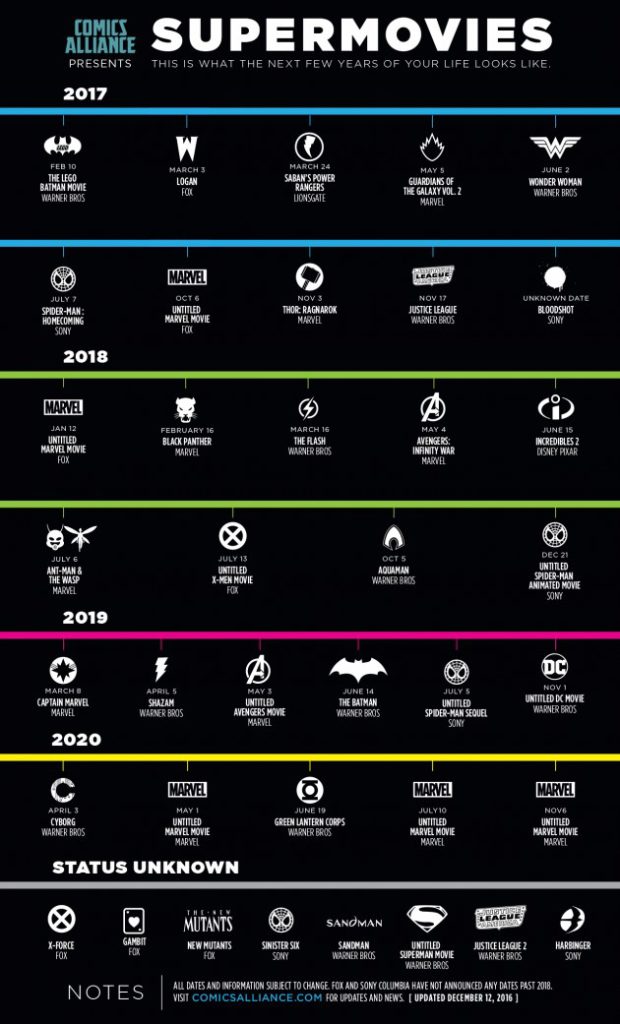The Ritchie and Carlin superhero debate concludes!
Part 3 discussed the social relevance of superheroes and the emerging trend of cinematic universes. Though we could go back and forth for many more posts, it is time to put this topic to rest (for now)…
Part 4 – Dawn of the Mega-Franchise
CARLIN: I look at the movie business now, and it’s totally inhospitable to new ideas, new stories. These superhero “mega-franchises” are emblematic, to my eyes, of Hollywood’s avaricious overreliance on branded IPs (which is, admittedly, a larger issue than just the comic-book adaptations). So, for that professional reason alone––set aside for a moment my cultural reservations about all this––I kind of hate those movies, and what they represent. I’ve had lots of impassioned conversations about this with screenwriter colleagues who love superhero movies and I say, “But doesn’t it piss you off that the same dozen filmmakers are making the same movies to the exclusion of new stories and new storytellers? Doesn’t it make you even a little mad that our generation won’t get to make its mark on Hollywood––or the greater culture––the way the last one did, because the handful of Gen X filmmakers who’ve been lucky enough to establish careers have opted to recycle ‘the ephemera of a previous century’ over forging new culturally defining entertainments for a correspondingly new millennium?” And they all just shrug and say, “Not really.”
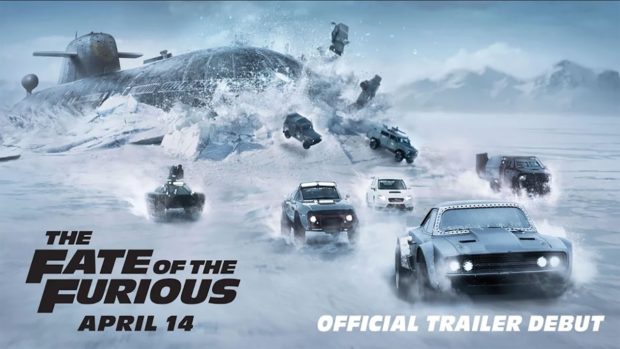
RITCHIE: I completely understand your frustration, even though I remain a fan of these mega-franchises. Hollywood has always been run by fear and greed, and that makes it near-impossible for big, original ideas to break out. Without an IP having been pre-established in comics, video games, novels, etc., producers simply don’t have enough faith behind the unknown projects that could launch new franchises. New characters. New legacies. Hollywood looks back to move forward, and if playing it safe can allow studio execs to hold onto their jobs for a while longer, that’s what will happen. Why take a big risk when low-risk projects can produce even bigger rewards?
I spent a decade writing scripts that execs loved but were ultimately too expensive to produce, too much of a risk since the content was original and without a tangible fanbase. While I adore the spectacle and scope of tentpole filmmaking, it’s a shame that up-and-coming writers can only hope to jump on an existing franchise if they want to be a part of that world. It’s almost as if landing a big project is a reward for making a successful smaller movie––now you get to play with the big boys. Worse still, the property itself is now more important from a marketing standpoint than the director, writer, or even actors. Just look at all the directors who have been chopped from or departed the various DCU films in development. Up-and-coming directors, who are now huge names, used to make random horror sequels in order to get the chance to helm a project utilizing their unique vision and talent. Now it seems like original ideas are just a jumping off point to land the big money sequels.
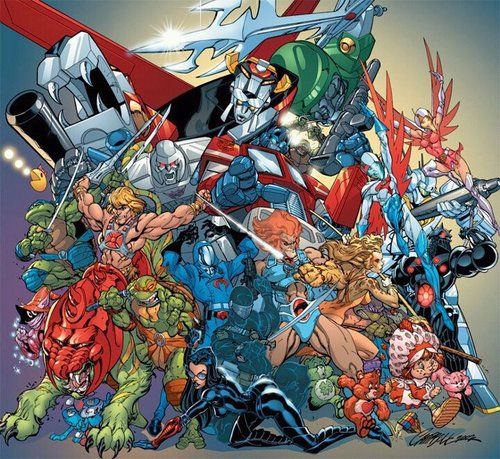 CARLIN: Maybe I’m over-intellectualizing it. Or maybe I’m simply not as emotionally evolved as many of my contemporaries; perhaps I take this all a bit too personally. But it does piss me off. And, my erstwhile screenwriting career notwithstanding, I don’t want to spend the rest of my life seeing Batman movies, Ghostbusters movies, Star Wars movies, Transformers movies. Those were great––in their day. But it’s starting to feel like were in a bit of an eighties time loop, like we’ve consigned ourselves to the teenage wasteland of a bygone culture, which is something I find deeply depressing. So for the sake of my personal sanity, I had to get out: I no longer watch or support movies based on an IP from the Gen X toy box. And if you examine the box-office receipts from this past summer, I may not be alone. I’ll be curious to see whether this past summer’s franchise meltdown is an anomalous dip, or if it is in fact a referendum on Hollywood’s nostalgia-for-profit business model.
CARLIN: Maybe I’m over-intellectualizing it. Or maybe I’m simply not as emotionally evolved as many of my contemporaries; perhaps I take this all a bit too personally. But it does piss me off. And, my erstwhile screenwriting career notwithstanding, I don’t want to spend the rest of my life seeing Batman movies, Ghostbusters movies, Star Wars movies, Transformers movies. Those were great––in their day. But it’s starting to feel like were in a bit of an eighties time loop, like we’ve consigned ourselves to the teenage wasteland of a bygone culture, which is something I find deeply depressing. So for the sake of my personal sanity, I had to get out: I no longer watch or support movies based on an IP from the Gen X toy box. And if you examine the box-office receipts from this past summer, I may not be alone. I’ll be curious to see whether this past summer’s franchise meltdown is an anomalous dip, or if it is in fact a referendum on Hollywood’s nostalgia-for-profit business model.
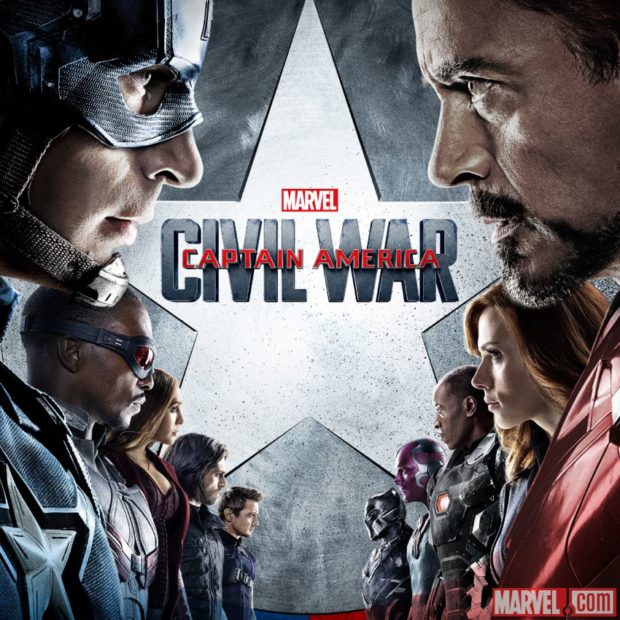 RITCHIE: I can see the detrimental effect of mega-franchises on cinema, so why do I support these films? Simple: you can’t help what you enjoy. I just watched Civil War on Blu-ray again, and it knocked my socks off. Such a giddy viewing experience. Marvel continues to kill it film after film after film. I’m fully invested in the universe they are building. The fanboy part of my nature may be contradictory to my struggles as a writer, but what can I do? I continue to get so much inspiration from these superhero stories, and it’s the closest I can get to that pure level of escapism from my childhood. Having said that, I love when an original idea breaks through all the hurdles and becomes a hit. Films like District 9 come to mind but unfortunately seem few and far between.
RITCHIE: I can see the detrimental effect of mega-franchises on cinema, so why do I support these films? Simple: you can’t help what you enjoy. I just watched Civil War on Blu-ray again, and it knocked my socks off. Such a giddy viewing experience. Marvel continues to kill it film after film after film. I’m fully invested in the universe they are building. The fanboy part of my nature may be contradictory to my struggles as a writer, but what can I do? I continue to get so much inspiration from these superhero stories, and it’s the closest I can get to that pure level of escapism from my childhood. Having said that, I love when an original idea breaks through all the hurdles and becomes a hit. Films like District 9 come to mind but unfortunately seem few and far between.
I’ll support any film that speaks to my sensibilities, but it’s on the studio/producer end to get more of those into production. There’s no shortage of talented writers/directors with great ideas; they just have to resist the $$$ and prestige when studios offer them the big franchises. And yet, I can understand wanting to make a franchise film, too. If I were ever offered a chance to write an X-Men or Friday the 13th film, I’d be over the moon. There’d be no hesitation. But I’m man enough to admit that there has to be some change to the summer formula. Original ideas cannot keep getting buried or ignored in favor of sequels/reboots/adaptations. Talent in front of and behind the camera need to make a stand and start taking more risks. Otherwise, how can you elevate the form or your personal creative growth? The industry should bring back the “one for them” and “one for me” philosophy many of the AAA actors of yore would employ. The creative balance in Hollywood is askew, and the general audiences are starting to feel it.
CARLIN: It would be heartening to think we’re demanding more from our popular artists––insisting that they produce works that reflect the folkways of the here and now––and not simply regurgitate the stale, inconsequential fantasies of a bygone era. Certainly the fact that the so-called “DCEU” hasn’t been able as of yet to appeal to an audience outside the hardcore comics fan base is an encouraging sign.
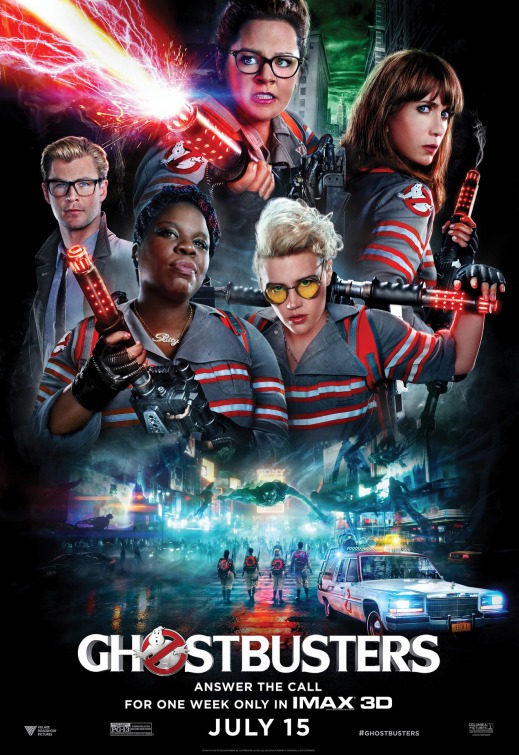 RITCHIE: As this summer proved, a certain level of fatigue has set in for many of these franchises. Not every property can become a billion-dollar grossing, multi-film franchise. I think Marvel stays fresh by introducing new characters every “phase,” and Star Wars has decades of history/endless worlds to explore. Those two aren’t going away anytime soon. But studios need to realize that not every story requires a $150 million budget. Ghostbusters (a film I quite enjoyed) could have easily been deemed a commercial success had it been given a more reasonable budget. Studios throw so much money at the production and marketing that these summer movies have to make at least double their budget to even earn a profit. That’s insanity! That’s asking too much of domestic audiences and promoting an over-reliance on international revenue that affects creative decisions. The more of these films that are released within weeks of each other, the less money they will make. Going to the movies is too expensive to see every superhero film. People are going to be pickier with their choices, and franchises will fail.
RITCHIE: As this summer proved, a certain level of fatigue has set in for many of these franchises. Not every property can become a billion-dollar grossing, multi-film franchise. I think Marvel stays fresh by introducing new characters every “phase,” and Star Wars has decades of history/endless worlds to explore. Those two aren’t going away anytime soon. But studios need to realize that not every story requires a $150 million budget. Ghostbusters (a film I quite enjoyed) could have easily been deemed a commercial success had it been given a more reasonable budget. Studios throw so much money at the production and marketing that these summer movies have to make at least double their budget to even earn a profit. That’s insanity! That’s asking too much of domestic audiences and promoting an over-reliance on international revenue that affects creative decisions. The more of these films that are released within weeks of each other, the less money they will make. Going to the movies is too expensive to see every superhero film. People are going to be pickier with their choices, and franchises will fail.
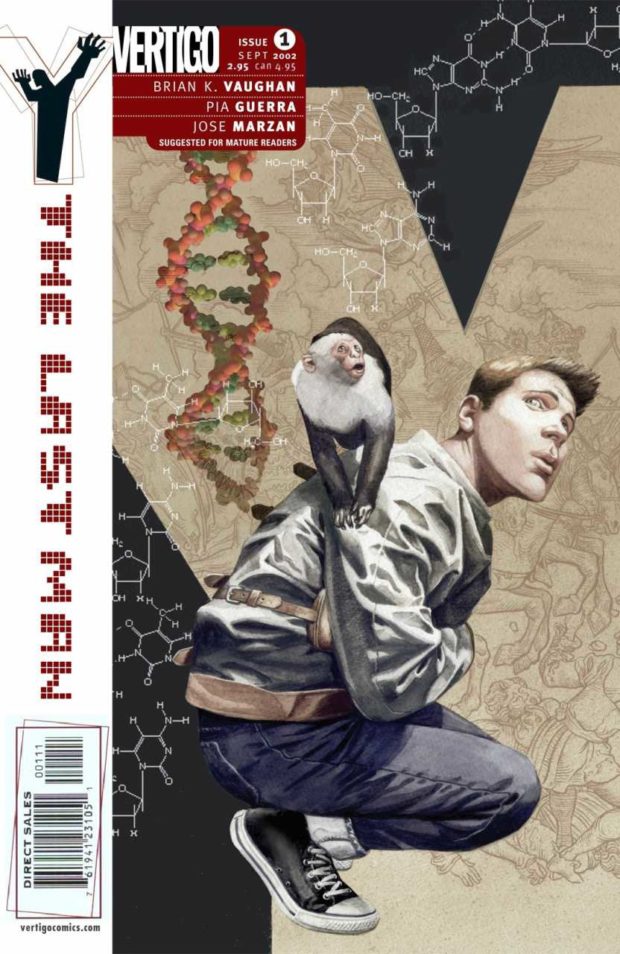 CARLIN: Personally, I’d prefer it if comic books went back to the late-eighties model of superhero stories for strictly a young audience, with specialty imprints like Vertigo that can offer suggested-for-mature-readers material like Y: The Last Man and Steve Niles’ Cal McDonald mysteries. But, that said, I certainly don’t see Gen X releasing its proprietary grip on superheroes anytime soon. If we don’t, though, I suspect Batman and Superman, et al., will die out with our generation––we will choke them of contemporary relevance––and perhaps decades from now, culture permitting, they will be reborn to serve once again as the children’s heroes they fundamentally are. We’ll see. But I do believe, with everything in me, that we will love these characters into obsolescence, and that that day isn’t as far off as we imagine.
CARLIN: Personally, I’d prefer it if comic books went back to the late-eighties model of superhero stories for strictly a young audience, with specialty imprints like Vertigo that can offer suggested-for-mature-readers material like Y: The Last Man and Steve Niles’ Cal McDonald mysteries. But, that said, I certainly don’t see Gen X releasing its proprietary grip on superheroes anytime soon. If we don’t, though, I suspect Batman and Superman, et al., will die out with our generation––we will choke them of contemporary relevance––and perhaps decades from now, culture permitting, they will be reborn to serve once again as the children’s heroes they fundamentally are. We’ll see. But I do believe, with everything in me, that we will love these characters into obsolescence, and that that day isn’t as far off as we imagine.
RITCHIE: Wishful thinking, my friend. Superheroes aren’t going anywhere in the foreseeable future. Even if the massive-budget films started to fail, even if the cinematic universes fell apart, there will always be an audience for superheroes. Having said that, can you imagine if just one summer––one summer––had no sequels/reboots/adaptations? One summer of all original, high concept tentpole movies that would establish a new slate of characters and worlds. I’d be happy to push back my favorite franchises for a while to let new ones breathe. I’m betting a lot of people would.
Until that time, we shall remain the Fanboy and the Apostate.
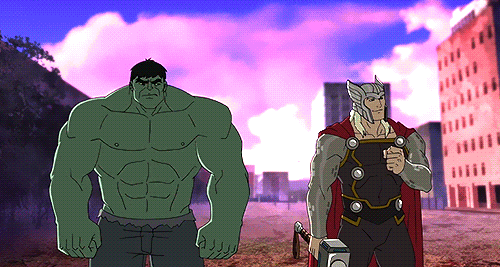
A huge thank you to Sean P. Carlin for participating in this debate. If you missed our three entries, check them out here.
